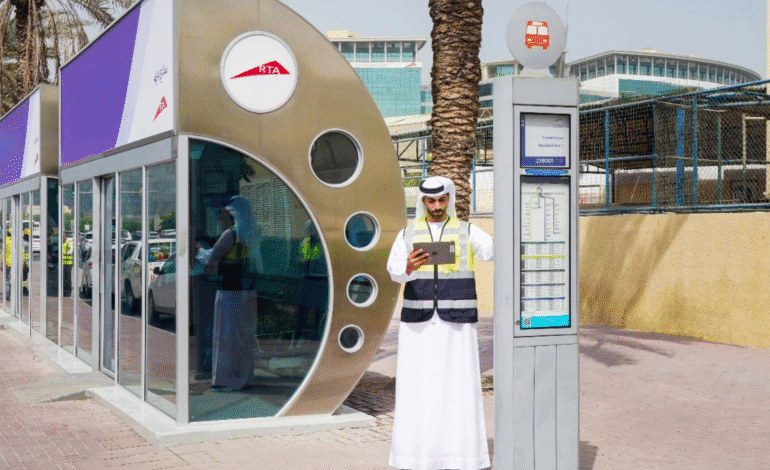Dubai RTA Prepares 893 AC Bus Shelters for Summer 2025

As the summer heat intensifies in Dubai, the Roads and Transport Authority (RTA) has proactively taken comprehensive steps to ensure the comfort and safety of public transport users. On Friday, the RTA announced the full operational readiness of 893 air-conditioned bus shelters across 22 key locations in the emirate, gearing up for the demanding summer months of 2025. This strategic move reflects RTA’s dedication to providing high-quality, user-centric urban infrastructure that accommodates the needs of residents and visitors alike.
Extensive Inspection and Maintenance Campaign
The RTA’s preparation started in March with a thorough inspection and maintenance campaign. This ongoing process is set to continue through the second quarter of 2025, covering all air-conditioned bus shelters throughout the emirate. The campaign’s primary objective is to maintain these facilities in peak condition to handle the increased demand and extreme temperatures during summer.
The proactive maintenance approach is designed to identify and rectify any technical or operational issues before they affect the public. This meticulous attention to detail ensures that every shelter remains a reliable, cool refuge for commuters waiting for buses.
Accessibility and Compliance with Dubai Universal Design Code
A key feature of these bus shelters is their full compliance with the Dubai Universal Design Code for People of Determination. This compliance guarantees that the shelters are accessible to all community members, including individuals with disabilities. Specifically, the shelters are equipped with designated spaces for wheelchair users, making public transport more inclusive.
Moreover, the shelters feature clear directional signage illustrating the bus mobility network within Dubai. This aids all passengers, including those unfamiliar with the city’s public transport routes, in navigating the system efficiently and confidently.
Environmentally Friendly Design and Urban Aesthetics
The RTA has designed the shelters with environmental sustainability in mind. Each shelter features a streamlined structure optimized for resistance to heat and wind, which is crucial given Dubai’s harsh summer climate. The choice of materials and design not only helps maintain the internal cooling efficiently but also contributes to reducing the urban heat island effect.
Beyond functionality, the shelters also enhance the urban landscape. They provide ample advertising space, which helps fund maintenance and development, while serving as visually appealing elements of Dubai’s modern cityscape. The integration of sustainable design principles aligns with Dubai’s broader commitment to environmental stewardship and smart city initiatives.
Ensuring Operational Efficiency: Round-the-Clock Monitoring
The Buildings and Facilities Department at RTA’s Corporate Administrative Support Services Sector has led the inspection and maintenance efforts. Shaikha Ahmad Al Shaikh, Director of Buildings and Facilities, emphasized the importance of continuous operational efficiency. She explained that the team conducted extensive site visits during both morning and evening hours to monitor the shelters’ functionality around the clock.
This thorough supervision allowed immediate corrective actions whenever any technical issues were detected. Such vigilance ensures that all shelters remain fully operational and comfortable for users regardless of the time of day.
Integration of Digital Technologies for Enhanced User Experience
In line with modern urban infrastructure trends, the RTA has installed digital display screens at these bus shelters. These screens provide real-time information on bus arrivals and departures, enhancing passenger convenience and enabling better time management for commuters.
The RTA’s inspection teams verified the functionality of these digital displays during their visits to guarantee uninterrupted service. The integration of smart technologies exemplifies RTA’s commitment to leveraging innovation to improve public transport experiences.
Commitment to Public Health and Safety Standards
In addition to technical maintenance, the RTA has prioritized health and hygiene at the bus shelters. Continuous cleaning and sanitisation patrols have been deployed, maintaining the shelters at high standards of cleanliness in accordance with public health guidelines.
This measure is particularly significant in the post-pandemic era, where sanitation plays a crucial role in safeguarding public health. The RTA’s efforts in this regard reassure users of their safety while using public transport facilities.
Engaging with Public Feedback for Continuous Improvement
The RTA actively encourages public engagement through dedicated communication channels. Users can submit feedback, comments, or suggestions about the air-conditioned bus shelters via the ‘Madinati’ service available on the RTA Dubai app.
This feedback mechanism allows the RTA to quickly identify and address issues, ensuring that services meet the expectations and needs of the community. Shaikha Ahmad Al Shaikh highlighted the importance of this interaction, noting that all reports are promptly reviewed by specialized teams committed to enhancing customer satisfaction.
Strategic Importance of Air-Conditioned Bus Shelters in Dubai’s Public Transport Network
Dubai’s summer temperatures often exceed 40 degrees Celsius, making air-conditioned shelters essential for public comfort. The RTA’s initiative to maintain and upgrade these shelters demonstrates foresight in tackling climate challenges while promoting public transport usage.
Comfortable waiting environments encourage more residents and visitors to opt for buses instead of private cars, contributing to reduced traffic congestion and lower carbon emissions. The shelters thus play a pivotal role in supporting Dubai’s sustainable transport goals.
Future Plans and Continuous Development
While the current readiness of 893 air-conditioned bus shelters is a significant achievement, the RTA remains focused on future improvements. Continuous evaluation of shelter performance and user needs will guide ongoing upgrades.
The RTA also plans to expand the network of air-conditioned shelters to cover more areas, enhancing accessibility and convenience across the city. The integration of advanced technologies, sustainability features, and inclusive design will remain priorities in these developments.








2 Comments
[…] message is particularly vital during Dubai’s summer, when temperatures often exceed 40°C. The campaign’s emphasis on child safety in vehicles […]
[…] spaces for wheelchair users make the stations inclusive for all. These enhancements reflect the RTA’s commitment to creating a public transport system that caters to diverse needs, fostering a sense of belonging […]
Comments are closed.